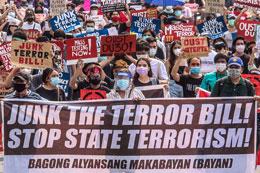Duterte deals death blows for democracy

The conviction of a prominent journalist for criminal libel in the Philippines and the move by President Rodrigo Duterte to install a new anti-terrorism law is a death blow for democracy in the Southeast Asian nation, say human rights groups and overseas-based Filipinos.
“The verdict against Maria Ressa highlights the ability of the Philippines’ abusive leader to manipulate the laws to go after critical, well-respected media voices whatever the ultimate cost to the country,” said Phil Robertson, deputy Asia director at Human Rights Watch.
Teodoro ’Ted’ Alcuitas, editor of the philippinecanadiannews.com said the verdict was the “outcome of a farcical trial under the ‘de facto’ martial law conditions of the Philippines.”
“No judge, not even the Supreme Court, will dare to go against the wishes of the tyrant, President Rodrigo Duterte,” wrote Alcuitas in a stinging editorial.
Filipino journalist Maria Ressa, head of a news website critical of Duterte, on Monday was found guilty of cyber libel in a verdict seen as a major blow to press freedom in the country.
Judge Rainelda Estacio Montesa sentenced Ressa, 56, and her co-accused, former researcher-writer Reynaldo Santos Jr, to imprisonment for up to six years, with a minimum term of six months and one day.
Montesa allowed Ressa and Santos to post bail, and their camp said they will appeal the verdict.
Ressa said the verdict was a blow to press freedom and democracy but wasn't unexpected and called on journalists and the public to continue the fight.
"We are meant to be a cautionary tale. We are meant to make you afraid ... Don't be afraid," she said.
"Because if you don't use your rights, you will lose them," she added. "If we don't challenge a brazen move to try to roll back the rights guaranteed in the constitution, we will lose them. We shouldn't be giving up our rights. We will fight."
The case stemmed from an article published by the news website Rappler in May 2012, which allegedly linked a businessman to human trafficking and drug smuggling.
Ressa was not the author of the report, which was posted four months before the law on cyber libel was enacted in September 2012, sparking criticisms that the case was politically motivated and filed in retaliation for Rappler's reporting on Dutere’s war on drugs, which has claimed thousands of lives in extrajudicial killings committed by police and police-linked “death squads.”
"This is a dark day not only for independent Philippine media but for all Filipinos," the National Union of Journalists of the Philippines said. "The verdict basically kills freedom of speech and of the press. But we will not be cowed."
Presidential spokesman Harry Roque denied Duterte had any hand in the cyber libel case, noting that he had never filed a libel case against any journalist during his political career.
Meanwhile, migrant worker groups and union leaders say they fear their freedom of expression and other rights may be further curtailed if the Philippine government enacts its new anti-terrorism bill.
“We condemn this law in the strongest terms. Countless activists have been harassed, sent to prison and killed without due process. This law legalizes all of that,” says Julia Mariano, a spokeswoman for Migrante International in Taiwan.
The House of Representatives passed the Anti-Terrorism Act on June 3, after it was approved by the Senate three months earlier. On Tuesday, the president’s office received the document.
Duterte, who this month marked the bill as urgent, has 30 days to approve or veto it amid growing opposition.
Overseas migrant leaders, much like those who oppose the law in the Philippines, are concerned that the new bill defines terrorism too broadly. Under the bill, a special council composed mainly of members appointed by the president would be in charge of ordering the detentions of anyone they deemed to be terrorists.
If it goes ahead, suspects could be detained without a warrant and remain in custody without being charged for more than three weeks.
Under current legal provisions, terrorism suspects must be brought before a judge in three days. Most rights groups argue that those taken into custody should appear before a judicial authority within 48 hours.
Mariano, a spokeswoman for the migrants’ group in Taiwan, says the bill’s definition of terrorism is too vague. “We know our government hasn’t taken criticisms well and it may dismiss them as terrorism or rebellion,” she says. “Citizens like me should not have to worry that our legitimate concerns will eventually cost our lives and safety.”
The Philippines has also been fighting Asia’s longest-running insurgency, which is led by the Communist Party of the Philippines and the paramilitary arm New People’s Army. Both are seen by Manila as terrorist organizations.
Rights groups and activists have previously been “red-tagged”, a local term referring to when someone is identified as a communist militant, which critics say has been used to silence dissent.
In November last year, the Philippines’ armed forces labelled 18 groups as fronts for “communist terrorism”. These included the local arm of the international charity Oxfam, a federation of churches and a women’s rights organization, sparking concerns for the safety of activists, who denied such links.
A United Nations report this month warned that the proposed anti-terror legislation could make things worse amid a backdrop of “the vilification of dissent”.
According to the UN, between 2015 and 2019, at least 248 human rights defenders, trade union members, legal professionals and journalists were killed in the Philippines due to their work.
The Philippine government said the report’s “faulty conclusions” were premised on alleged violations and that authorities had been focused on ensuring public safety and security. “That being said, the government will continue to respect its international legal obligations, including human rights,” the statement read.






